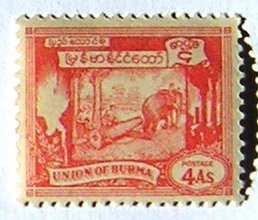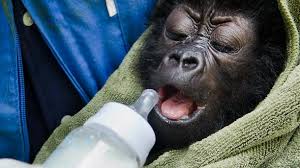Stamp: 4th Year Independence (Myanmar 1952)
4th Year Independence (Myanmar 1952)
04 January (Myanmar ) within release First Anniversary of independence, value in new currency goes into circulation Stamp 4th Year Independence face value 4 Burmese anna
| Stamp 4th Year Independence in catalogues | |
|---|---|
| Michel: | Mi:MM 131 |
| Stamp Number: | Sn:MM 130 |
Stamp is square format.
|
Data entry completed
46%
|
|
|---|---|
| Stamp 4th Year Independence in digits | |
| Country: | Myanmar |
| Date: | 1952-01-04 |
| Emission: | Definitive |
| Format: | Stamp |
| Face Value: | 4 Burmese anna |
Stamp 4th Year Independence it reflects the thematic directions:
Mammals are any vertebrates within the class Mammalia (/məˈmeɪli.ə/ from Latin mamma "breast"), a clade of endothermic amniotes distinguished from reptiles (including birds) by the possession of a neocortex (a region of the brain), hair, three middle ear bones and mammary glands. All female mammals nurse their young with milk, secreted from the mammary glands. Mammals include the largest animals on the planet, the great whales. The basic body type is a terrestrial quadruped, but some mammals are adapted for life at sea, in the air, in trees, underground or on two legs. The largest group of mammals, the placentals, have a placenta, which enables the feeding of the fetus during gestation. Mammals range in size from the 30–40 mm (1.2–1.6 in) bumblebee bat to the 30-meter (98 ft) blue whale. With the exception of the five species of monotreme (egg-laying mammals), all modern mammals give birth to live young. Most mammals, including the six most species-rich orders, belong to the placental group. The largest orders are the rodents, bats and Soricomorpha (shrews and allies). The next three biggest orders, depending on the biological classification scheme used, are the Primates (apes and monkeys), the Cetartiodactyla (whales and even-toed ungulates), and the Carnivora (cats, dogs, seals, and allies).
Elephants are the largest living land animals. Three living species are currently recognised: the African bush elephant (Loxodonta africana), the African forest elephant (L. cyclotis), and the Asian elephant (Elephas maximus). They are the only surviving members of the family Elephantidae and the order Proboscidea; extinct relatives include mammoths and mastodons.
Forestry is the science and craft of creating, managing, planting, using, conserving and repairing forests and woodlands for associated resources for human and environmental benefits. Forestry is practiced in plantations and natural stands. The science of forestry has elements that belong to the biological, physical, social, political and managerial sciences. Forest management plays an essential role in the creation and modification of habitats and affects ecosystem services provisioning
Animals are multicellular, eukaryotic organisms of the kingdom Animalia (also called Metazoa). All animals are motile, meaning they can move spontaneously and independently, at some point in their lives. Their body plan eventually becomes fixed as they develop, although some undergo a process of metamorphosis later on in their lives. All animals are heterotrophs: they must ingest other organisms or their products for sustenance.
An anniversary is the date on which an event took place or an institution was founded in a previous year, and may also refer to the commemoration or celebration of that event. For example, the first event is the initial occurrence or, if planned, the inaugural of the event. One year later would be the first anniversary of that event. The word was first used for Catholic feasts to commemorate saints. Most countries celebrate national anniversaries, typically called national days. These could be the date of independence of the nation or the adoption of a new constitution or form of government. The important dates in a sitting monarch's reign may also be commemorated, an event often referred to as a "Jubilee".





